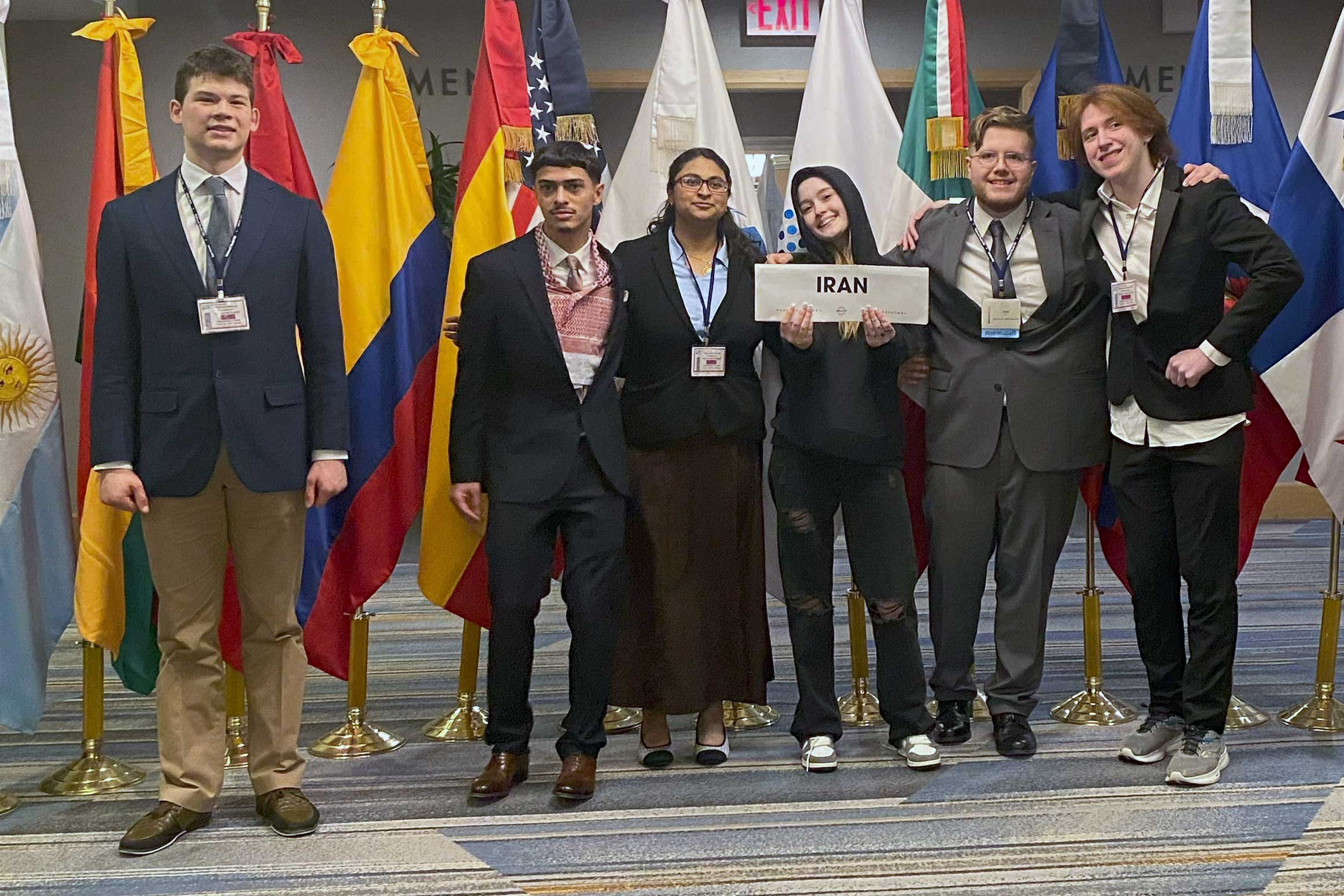Vassar Students Forge Collaborations and Gain Confidence in International Studies Class
It’s one thing to learn about how nations reach agreement on contentious issues in a textbook, or even a news feed; it’s another to put yourself in the position of an international diplomat trying to forge consensus.
Yet that’s exactly what four Vassar students and two students from Dutchess Community College (DCC) found themselves doing in April at the National Model United Nations (MNUN) conference in New York City—the culmination of months of study and preparation while enrolled in International Studies 249: National Model United Nations.

The course is a unique, 25-years-strong collaboration between Vassar and DCC—currently taught by DCC Associate Professor of Government Matthew Murray. Marist University also got into the act, joining in two UN simulations held in Poughkeepsie before all the students headed to the city conference. This year’s participants, known in competition as the Hudson River Group, were: Maham Rahman ’25, Jariel Melendez ’26, Matthew Okulski ’28, Barnaby Williams ’28, Alexander McCormack (DCC), and Hanna Kelleher (DCC). Each represented Iran, the group’s assigned country, on a different UN committee whose topics ranged from assisting refugees to preventing the use of chemical weapons. In all, more than 1,000 students from 100 countries took part in the conference, which was held at the New York Hilton Midtown and at the UN itself, from April 13–17.
Murray noted that representing Iran “was one of the more challenging assignments I can recall receiving, but our students answered the call to faithfully represent views with which they often disagreed.” The whole point of the simulation, Murray explained, is to understand international issues more deeply by examining them from all the sides that exist in the real world.
“Iran, with its nuclear program, with its support for various non-state armed groups throughout the Middle East and elsewhere, [and] some of its own human rights issues, can be a challenge, but it’s one that also needs to be done well if the conference is going to run well,” Murray said. “If Iran is acting like Canada, the simulation doesn’t feel as much like a simulation, and it kind of removes that realistic aspect.”
Maham Rahman ’25, who in September will join the Peace Corps as a community economic development facilitator in Fiji, said the experience gave her valuable insight as she begins her career in international affairs and economic development. “Since we are such a small delegation and we all represented our own committees ourselves, I did find it difficult to represent Iran at first and during the simulation,” she said. “However, that difficulty pushed me to dive deep into Iran’s foreign policy, international efforts, and domestic values. I found that to be a rewarding experience and one I’m very thankful for as I pursue a career in international work.”
Matthew Okulski ’28, who represented Iran on the Chemical Weapons Committee, agreed that “at first it was a pretty daunting task, especially with the committee that I was in.” However, he said, participating in the NMUN gave him valuable experience as he considers a career in international law or diplomatic relations.
“Once we got to the conference, that’s when you really got to see why this class is so special,” Okulski said. “I got to meet people from all over the globe with so many diverse perspectives and different experiences. I think that collaboration, putting all of our minds together, works in the spirit of the UN and also shows that future generations can collaborate together. It was just a great experience overall and I think that being exposed to all these different people was definitely great.”
“It was my favorite class, honestly,” agreed DCC student Alexander McCormack, who just earned his associate’s degree. “I had to give three speeches in front of hundreds of people and that really helped me feel a lot more comfortable talking in front of people. I think that was the biggest thing I took away—the confidence you get. The first speech you give is terrifying. And then, it gets easier and easier. And by my last speech, I felt like I could take on the world.”